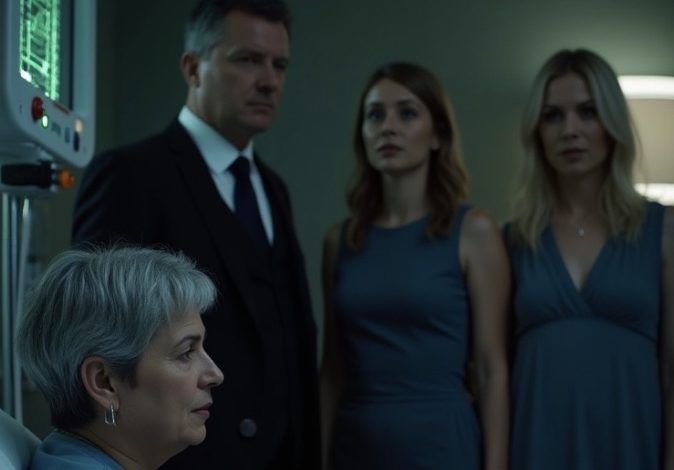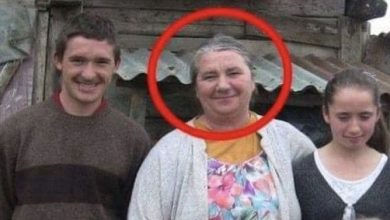“At the Edge of Life Support, My Ex-Daughter-in-Law Revealed the Truth About Her ‘Accident’ in a Way No One Expected”

My ex-daughter-in-law lay in a coma after what everyone kept calling an accident. My son and his new wife were already whispering about “letting her go peacefully,” but something in my heart refused to believe it was that simple. I sat by her bed, holding her hand, unwilling to release her. And then, against all odds, her fingers twitched. She tapped a sequence of dots and dashes in Morse code, a code I had once taught her myself. The message was clear and chilling:
“N-O-T A-N A-C-C-I-D-E-N-T.”
What followed left everyone stunned.
The Intensive Care Unit is not a place for the faint of heart. The smell of antiseptic hangs heavy in the air, and the constant beeping of machines feels like a clock ticking down the moments of someone’s life. I, Margaret Clark, seventy years old and widowed for a decade, sat beside Emily’s bed. She was once my daughter-in-law, and in my heart, she had always remained my daughter.
Her beautiful face, normally so lively and expressive, was pale and still. Tubes and wires wrapped around her like vines. She looked more like a fragile porcelain doll than the woman I had once known—full of laughter, kindness, and fire.
At the foot of the bed stood my son, David, and his second wife, Vanessa. Their act of sorrow was as polished as a stage performance, but to me it felt hollow.
“Mother,” David said, his tone flat, almost bored, “the doctors agree there’s no chance. Her brain damage is too severe. She isn’t coming back.”
Vanessa, with her perfect blonde curls and an expression that tried too hard to look sympathetic, added, “Look at her, Margaret. This isn’t life. She’s trapped, tied to machines. Emily was a strong woman. She would never want this. We need to let her go.”
Her words dripped like honey but burned like poison.
“She’s right,” David pressed, still avoiding my eyes. “We should let her pass peacefully. The doctors can do it tomorrow if we agree.”
Let her go. Those three words were daggers. They weren’t speaking of mercy; they were speaking of convenience.
I swallowed hard, keeping my voice steady. “I want time alone with her,” I said. “Before any decisions are made. I need to say goodbye.”
David shifted uncomfortably, but Vanessa forced a sweet smile. “Of course, Margaret. We’ll get some coffee. Take your time.”
As soon as they left, I slid my chair closer, cradling Emily’s limp hand in mine.
“Emily, sweetheart,” I whispered, my voice trembling. “It’s me. Do you remember when you first married David, how my husband—the Navy pilot—taught us Morse code? Our secret language. He said, ‘One day, this could save a life.’ I laughed then. I never thought those words would matter so much.”
I stroked her knuckles gently. “If you can hear me, give me a sign.”
At first, nothing. And then—tap. A pause. Tap, tap. My heart leapt. She was spelling letters. Slowly, painfully:
N-O-T A-N A-C-C-I-D-E-N-T.
A chill ripped through me, but it was quickly replaced by resolve. She hadn’t tripped and fallen. Something far darker had happened.
The so-called “accident” had been explained away too neatly. Emily had fallen down the staircase during an argument with David. But I knew my son’s temper, and I knew Emily’s grace. She was too careful, too balanced to simply stumble.
And Vanessa… Vanessa had never hidden her contempt for Emily. From the very first meeting, I had seen the jealousy simmering beneath her polite smile. Emily’s presence reminded her that David had once loved someone else, truly loved her. And Emily still owned shares in the company David and Emily had built together before their marriage collapsed. Shares that were about to become worth millions once a buyout went through.
If Emily died before the deal, those shares would default to David. If she lived, she would walk away wealthy and independent. Suddenly, the timing of this “accident” made chilling sense.
I needed proof. Something undeniable. I found the charge nurse, a tired but kind woman named Rodriguez.
“I might be imagining things,” I said softly, letting my voice quiver like any grieving grandmother. “But I thought I felt her hand move. Could you please watch her monitors while I speak to her again? Just… for my peace of mind.”
Her eyes softened. “Of course. I’ll keep an eye.”
When I returned, David and Vanessa were back, whispering urgently in the corner like vultures biding their time. I sat down, laced my fingers with Emily’s, and raised my voice so every word echoed through the room.
“Emily, darling, it’s me. Think about the stairs. You and David were arguing. Was he there? Or… was it Vanessa?”
The effect was immediate. The heart monitor, steady until now, spiked into a frenzy. The beeps came fast and loud. Her brainwave monitor also surged, showing sudden bursts of activity.
Vanessa’s mask cracked. Her face drained of color. “Stop it! You’re upsetting her!” she cried, rushing forward to grab my arm.
“I’m only talking to her,” I said calmly, locking eyes with her.
“You’re tormenting her! David, do something!” she hissed.
But David’s expression had changed. He looked pale, terrified, watching the monitors that proved Emily was aware.
Nurse Rodriguez burst in, her eyes wide. “There’s a neurological response,” she said quickly, jotting notes. “I need to call neurology immediately. This changes everything.”
Her words hit like thunder. Emily’s silence had spoken—and it had accused.
Within hours, a new medical team confirmed what I already knew: Emily was not brain-dead. She was conscious, trapped inside her body.
The police were called. A detective named Miller interviewed me. “Mrs. Clark, tell me again about the Morse code.”
I told him everything—how my husband had taught us, how Emily tapped the words into my palm, how the monitors had spiked when I mentioned Vanessa.
The detective nodded slowly. “At first, I thought this was just wishful thinking. But combined with the monitors… it’s evidence.”
A re-examination of the accident scene followed. This time, investigators found what had been overlooked: a broken heel from one of Vanessa’s shoes wedged under the carpet at the top of the stairs, scuff marks on the banister matching David’s ring, and phone records showing a 20-minute delay before 911 was called.
Together with the financial motive—the pending buyout of the tech company—it painted a clear picture. David and Vanessa had tried to kill Emily.
They were arrested for attempted murder.
Emily’s recovery was long. Months of therapy, endless hours of speech and movement exercises. But I was with her every day, tapping encouragement into her hand in our secret language.
Two years later, she sat in a wheelchair in my garden, sunlight spilling across her face. Her smile, weak but real, lit up the entire yard.
“I remember,” she said softly one afternoon. “I remember Vanessa pushing me. And David… just watching.”
“You don’t have to remember anymore,” I told her, tears in my eyes. “You’re safe now.”
She squeezed my hand—this time with real strength. Slowly, deliberately, she tapped against my palm.
M-Y H-E-R-O.
My breath caught.
I smiled through my tears. “He taught us well, didn’t he, Emily? Our code saved your life.”
And I knew then that the happy ending wasn’t about revenge. It was about survival, about truth breaking through silence. Emily had been pulled back from the edge of death by a secret language of love—and by the will to fight against betrayal.










